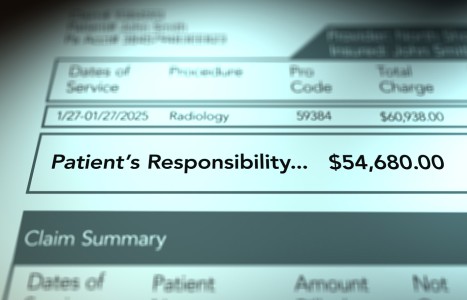On Oct. 21, 2025, a judge in Florida issued a groundbreaking decision in Complete Care v State Farm, 25-CA-1063. It concerns a fact pattern that many chiropractic doctors have faced wherein an insurer, such as State Farm or Allstate, decides to simply stop paying all claims submitted by a healthcare provider.
| Digital ExclusiveThe Adrenal-Thyroid Connection, Part 2: Assessment and Treatment Considerations
In part 1 of this article [March 26 DC], I outlined the connection between adrenal fatigue and thyroid dysfunction, and suggested thyroid and adrenal support supplements that can be administered to patients presenting with symptoms suggestive of problems affecting either or both organs. For practitioners who wish to probe further in an attempt to gather more objective evidence for adrenal fatigue and/or thyroid dysfunction, the following information will prove valuable from a clinical assessment and monitoring standpoint.
Thyroid Testing
The conventional way to test for an underactive thyroid is to assess the patient's TSH (thyroid stimulating hormone) blood level. The higher the value, the more stimulation the thyroid gland needs in order to synthesize and secrete thyroid hormone. Thus, higher levels of TSH in the blood indicate an underactive thyroid.
Conventional medical doctors have been taught that the normal range for TSH is 0.2-5.5 mU/L, a range some more holistically minded practitioners (myself included) consider too high. For example, the past president of the Life Extension Foundation, Philip Lee Miller, MD, teaches that the ideal range for TSH is actually between 1.0-2.0 mU/L, and that any value above 2.0 mU/L suggests underactive thyroid function. Taking this perspective, it is easy to see why many patients who have been told they have normal thyroid function - even in the presence of classic signs and symptoms of an underactive thyroid - could have a thyroid problem that is not being addressed.
From a patient management standpoint, it may be possible to lower the TSH from as high as 4.0 mU/L down to the ideal range of 1.0 -2.0 mU/L via supplementation alone by using the thyroid support supplement cocktail I outlined in part 1 of this article, whereas a TSH level above 4.0 mU/L most often indicates that the patient requires thyroid replacement therapy, which unfortunately involves the use of a prescription drug. However, most medical doctors prescribe a synthetic thyroid replacement drug, such as Synthroid or levothyroxine, synthetic versions of T4 thyroid hormone. Many holistic medical doctors and naturopaths have provided objective evidence to show that prescription-based desiccated thyroid (porcine source) tablets provide a more effective approach to thyroid replacement therapy in these patients than does the use of synthetic thyroid drugs.
It is important to note that the body converts T4 thyroid hormone into T3, and that T3 is the most active form of thyroid hormone. Desiccated thyroid tablets contain both T3 and T4 forms of thyroid hormone, whereas synthetic thyroid drugs contain only T4. More holistic practitioners claim that the inclusion of T3 in desiccated thyroid explains the superior results it provides, as many thyroid patients also have difficulty converting T4 to the more active T3.
What You Can Do
- Request that the patient bring you a copy of their bloodwork and determine their TSH level to see if the patient's family doctor or endocrinologist has used conventional thinking, or the more optimal range interpretation, to determine the patient's thyroid status.
- If their TSH value is above 4.0 mU/L, then help the patient find a more holistically-minded doctor who will prescribe desiccated thyroid.
- Even if the patient is prescribed thyroid replacement (whether synthetic or desiccated thyroid), providing them with a thyroid support supplement can help improve thyroid status.
- If the patient's TSH level is between 2.0 and 4.0 mU/L (thyroid dysfunction), then you can try using a support supplement for 2-3 months first to see if the TSH levels drops down into the ideal range (1.0-2.0 mU/L). If it doesn't, then the patient likely will need to take a prescription-based thyroid replacement therapy drug (preferably desiccated thyroid).
- It is also helpful to know the patient's blood levels of free T4 and free T3. These are the unbound levels of thyroxin hormone available to the body's tissues. The ideal range for free T4 is 1.2-1.4 ng/dL, according to Dr. Miller, whereas conventional medical doctors generally accept a range between 0.7-1.53 ng/dL as being normal.
- Similarly, the ideal range for free T3 is reported to be 2.8-3.2 pg/ml, whereas conventional medical doctors accept a range between 2.6-4.8 pg/ml as being normal.
- According to more holistically-minded doctors, if the free T4 level is below 1.2 ng/dL and/or the free T3 level is below 2.8 pg/nl, then thyroid replacement therapy is likely required.
- In many cases, conventional doctors do not order the free T3 and free T4 blood tests. Patients with thyroid-type symptoms should request free T3 and T4 panel along with the TSH test.
Adrenal and Cortisol Assessment
Although not routinely requested in the evaluation of the patient's thyroid status by conventional medical doctors, blood levels of cortisol, DHEA and the DHEA:cortisol ratio can help practitioners discern if the patient's symptoms are being complicated by the impact of stress on the patient's adrenal function.
The ideal range for blood cortisol is reported to be 9-14 mcg/dL. A cortisol level above this value suggests elevated cortisol, which can interfere with thyroid hormone synthesis and/or block the effects of thyroid hormone (T4 and T3) at the cellular level; whether the thyroid hormone was secreted by the patient's thyroid gland or administered as a synthetic T4-containing thyroid replacement drug (e.g., Synthroid) or as desiccated thyroid tablets.
In addition, it is valuable to know the patient's DHEA blood levels (dehydroepiandrosterone), as DHEA levels decline in cases of the adrenal stress response. This occurs because the adrenal glands use cholesterol to manufacture both cortisol and DHEA. When they up-regulate the biochemical pathway that synthesizes cortisol, DHEA synthesis automatically declines. As DHEA is the precursor molecule from which the body synthesizes testosterone and estrogen, it is easy to see why patients with adrenal fatigue often report a decline in libido, sexual performance, lean mass gains and abdominal fat accretion (not to mention the amplified adverse effects on bone density) as part of the constellation of symptoms and signs involved in the adrenal stress response.
Ideal levels of DHEA are considered to be 250-450 mcg/dL for men and 150-350 mcg/dL for women. The ideal ratio of DHEA to cortisol is reported to be 15-25:1. When DHEA levels are low and/or the DHEA:cortisol ratio is low, some doctors prescribe DHEA supplementation, which has been shown to counter many of the effects of high cortisone levels attributable to the stress response and/or the aging process. The danger is that DHEA supplementation may increase risk of prostate, breast and endometrial cancer; thus, I do not recommend DHEA supplementation as the first course of action in these cases.
My preference is to provide the patient with B vitamins, vitamin C, zinc, and adaptogen herbs (outlined in part 1 of this article as an element of the ideal adrenal support supplement), which are shown to decrease the release of cortisol from the adrenal glands in these cases, and provide many other anti-stress and anti-fatigue benefits in patients suffering from adrenal dysfunction due to stress.
Saliva Cortisol Testing
One additional way to assess adrenal dysfunction is through the diurnal evaluation of saliva cortisol testing. The World Health Organization has indicated that saliva testing of cortisol levels is a reliable index of cortisol's effects on the body's tissues.
The test involves simply spitting into a test tube. Cortisol is measured four times: in the morning (8 a.m.), noon, late afternoon (4 p.m.) and night (best between 11 p.m. and midnight). Other steroid hormones, such as estrogen, progesterone, DHEA and testosterone, can be measured along with cortisol in the 8 a.m. saliva sample if desired.
Once the sample set is complete, the tubes are mailed back to the lab for analysis in the mailing envelope that is included with the test kit. Test results from the lab are usually mailed back within two weeks. Several labs that provide the service can easily be found with an online search.
The adrenal glands produce cortisol 24 hours per day with a regular diurnal variation. Cortisol output is highest within the first hour after waking, declines steadily through the day and reaches a low during sleep. Adrenal exhaustion tends to result in a flattened cortisol profile with loss of morning surge, while earlier stages of the general adaptation syndrome generally result in one or more elevated cortisol points.
Take-Home Points
Many patients present with a constellation of symptoms and signs suggestive of an underactive thyroid gland and/or adrenal dysfunction. In some cases, adrenal dysfunction due to stress causes or amplifies problems involving an underactive thyroid. As many conventional medical doctors use an outdated reference range to evaluate thyroid function, it is important to request a copy of the patient's bloodwork in order to evaluate their status using the optimal reference ranges promoted by Dr. Miller and an increasing number of doctors, including some trained through the American Academy of Anti-Aging. In addition to TSH blood levels, the patient should also request evaluation of their free T4 and T3 blood levels to complete the thyroid profile.
In the assessment of adrenal involvement, the patient's cortisol, DHEA and DHEA:cortisol ratio should be determined from their bloodwork. Saliva cortisol should be included to view the patient's diurnal output of cortisol. It is important to remember that high cortisol levels may block the effects of thyroid hormone at the cellular level and/or contribute significantly to the inability of the thyroid gland to synthesize and secrete optimal levels of thyroid hormone. As such, adrenal status and thyroid status should be assessed concurrently.
Nutritional supplements including adaptogen herbs and key vitamins and minerals have shown to exert remarkable effects in lowering cortisol levels and improving other effects of stress on body tissues, including brain function. These nutrients should be used as part of cases management when the stress response is determined to be a contributing factor to the patient's symptom picture. There are also thyroid-support nutrients that can bolster thyroid function and improve the conversion of T4 to T3, which is the most active form of thyroid hormone.
A thyroid-support supplement combination of this nature can be used as a sole intervention in cases of thyroid dysfunction when the patient's TSH level is between 2-4 mU/L. If the patient's TSH level is above 4 mU/L, they will most likely require thyroid hormone replacement (ideally desiccated thyroid). Thyroid support nutrients can enhance the efficacy of thyroid hormone replacement, and thus, should also be administered as an adjunctive measure in patients who are prescribed thyroid hormone replacement therapy.


